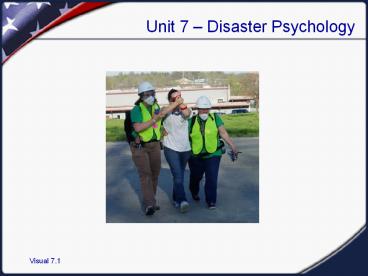Unit 7 - PowerPoint PPT Presentation
1 / 18
Title:
Unit 7
Description:
The process of change in the rescuer resulting from empathic engagement with survivors. ... of time that has elapsed between the event occurrence and the ... – PowerPoint PPT presentation
Number of Views:35
Avg rating:3.0/5.0
Title: Unit 7
1
Unit 7 Disaster Psychology
2
Unit Objectives
- Describe the disaster and post-disaster emotional
environment. - Describe the steps that rescuers can take to
relieve their own stress and those of disaster
survivors.
3
Vicarious Trauma
- Definition
- The process of change in the rescuer resulting
from empathic engagement with survivors.
4
Possible Psychological Symptoms
- Irritability, anger
- Self-blame, blaming others
- Isolation, withdrawal
- Fear of recurrence
- Feeling stunned, numb, or overwhelmed
- Feeling helpless
- Mood swings
- Sadness, depression, grief
- Denial
- Concentration, memory problems
- Relationship conflicts/marital discord
5
Possible Physiological Symptoms
- Loss of appetite
- Headaches, chest pain
- Diarrhea, stomach pain, nausea
- Hyperactivity
- Increase in alcohol or drug consumption
- Nightmares
- Inability to sleep
- Fatigue, low energy
6
Team Well-Being
- CERT team leaders should
- Provide pre-disaster stress management training.
- Brief personnel before response.
- Emphasize teamwork.
- Encourage breaks.
- Provide for proper nutrition.
- Rotate crews.
- Phase out workers gradually.
- Conduct a brief discussion.
- Arrange for a post-event debriefing (CISD).
7
Reducing Stress
- Get enough sleep.
- Exercise.
- Eat a balanced diet.
- Balance work, play, and rest.
- Allow yourself to receive as well as give.
- Connect with others.
- Use spiritual resources.
8
Critical Incident Stress Debriefing
- Six phases
- Introduction and a description
- Review of the factual material
- Sharing of initial thoughts/feelings
- Sharing of emotional reactions to the incident
- Instruction about normal stress reactions
- Review of the symptoms
- Closing and further needs assessment
9
Survivor Emotional Phases
- 4 Phases
- Impact
- Inventory
- Rescue
- Recovery
10
4 Phases
- 1. Impact survivors show no emotion
- 2. Inventory survivors assess the damage and
try to locate other survivors. - 3. Rescue survivors will take direction from
any type of rescuer (i.e. CERTs) - 4. Recovery survivors appear to pull together
against their rescuers. - Blame will be placed on the rescuers for not
doing enough.
11
Traumatic Crisis
- An event in which people experience or witness
- Actual or potential death or injury to self or
others. - Serious injury.
- Destruction of homes, neighborhood, or valued
possessions. - Loss of contact with family/close relationships.
12
Traumatic Stress
- Traumatic stress may affect
- Cognitive functioning.
- Physical health.
- Interpersonal reactions.
13
Mediating Factors
- Prior experience with a similar event
- The intensity of the disruption in the survivors
lives - Individual feelings that there is no escape,
which sets the stage for panic - The emotional strength of the individual
- The length of time that has elapsed between the
event occurrence and the present
14
Stabilizing The Individual
- Assess the survivors for injury and shock.
- Get uninjured people involved in helping.
- Provide support by
- Listening.
- Empathizing.
- Help survivors connect with natural support
systems.
15
Avoid Saying . . .
- I understand.
- Dont feel bad.
- Youre strong/Youll get through this.
- Dont cry.
- Its Gods will.
- It could be worse or At least you still have .
. .
16
Managing the Death Scene
- Cover the body treat it with respect.
- Have one family member look at the body and
decide if the rest of the family should see it. - Allow family members to hold or spend time with
the deceased. - Let the family grieve.
17
Informing Family of a Death
- Separate the family members from others in a
quiet, private place. - Have the person(s) sit down, if possible.
- Make eye contact and use a calm, kind voice.
- Use the following words to tell the family
members about the death Im sorry, but your
family member has died. I am so sorry.
18
The End































